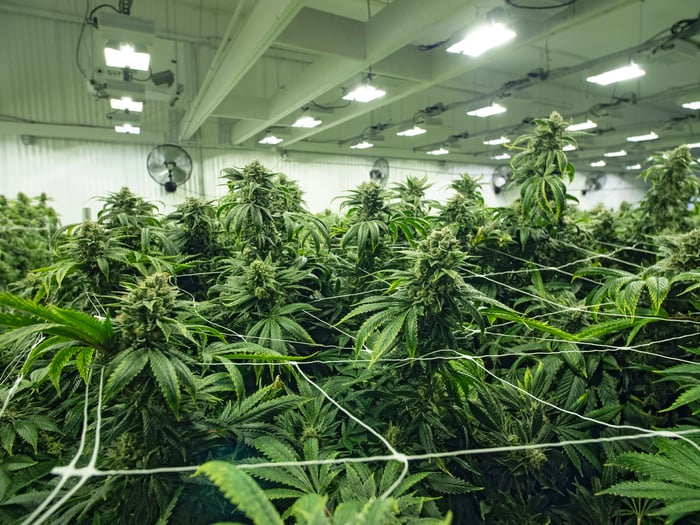Marijuana is projected to be one of the fastest-growing industries this decade. With tens of billions of dollars being sold annually in the North American black market, it might be only a matter of time before illicit consumers begin moving toward legal channels in select U.S. states and in Canada. To date, two-thirds of U.S. states have waved the green flag on cannabis in some capacity. Canada was the first industrialized country to legalize weed for adult use back in October 2018.
If there's one thing high-growth industries are good at, it's attracting investment dollars. Perhaps no marijuana stock has done a better job of that than Alberta-based Aurora Cannabis (ACB 9.54%).

Image source: Getty Images.
The complete package?
On paper, Aurora Cannabis looks like a bit of a dream stock. It's slated to be one of the top cultivators in Canada and has been regularly outproducing its peers. Although Canopy Growth is a bit secretive about its output, Aurora is transparent, having produced 36,207 kilos of cannabis in the fiscal third quarter ended in March. At this pace, Aurora would deliver around 145,000 kilos of marijuana each year, with other growing facilities waiting in the wings to be ramped up.
That's another key point of the Aurora allure: the size of the company's cultivating facilities. The Aurora Sky facility is a roughly 800,000-square-foot facility that's up and running. Aurora Nordic 2 in Denmark and Aurora Sun in Alberta chime in with 1 million square feet and 1.62 million square feet of growing space respectively. Though construction at Aurora Nordic 2 and Aurora Sun is on hold, the potential to use economies of scale to Aurora's advantage could push cash cost to produce per gram of dried cannabis sold well below the $0.85 Canadian ($0.64 U.S.) reported in the fiscal third quarter.
Aurora's investor following is also attracted to the company's international ties. Whether through production, partnerships, research, or exports, Aurora has access to approximately two dozen markets outside of Canada. Mind you, this also includes the U.S. market following the acquisition of cannabidiol (CBD)-based product developer Reliva.
But you can't believe everything you see when it comes to Aurora Cannabis.

Image source: Getty Images.
Don't be duped by Aurora's book value
There's one number that diligent investors are bound to come across during their research, and to put things plainly, it's highly misleading. I'm talking about Aurora Cannabis' book value.
Generally speaking, growth investors don't pay a whole lot of attention to book value, as they're more focused on sales growth and the push toward positive earnings before interest, taxes, depreciation, and amortization (EBITDA). But with Aurora Cannabis having fallen more than 90% in the past 17 months, some have suggested that Aurora is a value stock based on its price-to-book value.
Based on the company's reverse-split-adjusted book value of CA$35.80 ($27.15 U.S.), Aurora is currently trading at roughly 37% of its fiscal Q3 shareholder equity. Bargain, right?
Not so fast.
Many of the figures that went into calculating Aurora's shareholder equity might as well be plucked from thin air; there's little guarantee that they will hold up over time. It's unlikely, for instance, that CA$2.42 billion in goodwill is going to be recouped at some point in the future. This CA$2.42 billion accounts for more than half of the company's total assets, with approximately CA$2 billion of this goodwill derived from Aurora's acquisition of MedReleaf in July 2018.

Image source: Getty Images.
Without beating around the cannabis bush, the MedReleaf deal was the worst acquisition in cannabis' admittedly short history. MedReleaf's 55,000-square-foot Markham facility was part of five smaller grow farms that Aurora Cannabis recently shuttered to conserve its capital and lower costs. Meanwhile, the 1-million-square-foot Exeter greenhouse that was recently sold was never retrofitted for its projected 105,000 kilos of annual marijuana output. This means Aurora ponied up CA$2.64 billion in an all-stock deal for just a 210,000-square foot production facility capable of 28,000 kilos a year in output and a handful of MedReleaf's proprietary brands in return. There's no chance Aurora is going to recoup CA$2 billion in goodwill from this deal, leading me to believe that somewhere around three-quarters of its existing goodwill could eventually be written down.
The company will also have to deal with revaluing its property, plant, and equipment. Remember, since the end of March, it sold the Exeter facility for roughly a third of what MedReleaf paid for it in April 2018 and announced that it would be closing five of its smaller grow farms. That's six of its 15 facilities now off the grid, with two of its largest projects in limbo due to regulatory issues in Canada. There's absolutely no way that Aurora's property, plant, and equipment are worth anywhere close to the CA$1.05 billion value they held on March 31.
Even the company's intangible assets and/or inventory could face a future impairment. New store openings in Ontario may provide a path for Aurora to sell down its more than CA$251 million in cannabis inventory as of March 31. But we've consistently witnessed more production than demand for multiple quarters. That's a recipe for a writedown.
You might see a marijuana stock that's trading at 37% of its book value. I see a company whose book value absolutely can't be trusted as a viable metric.





